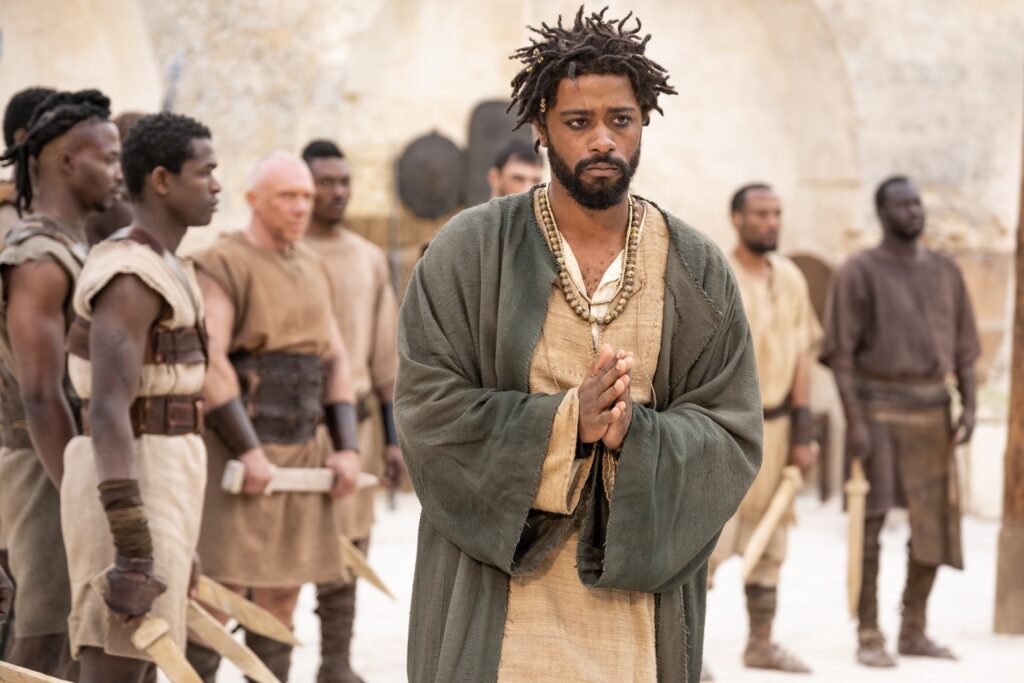
(**)
It is written. Making a befuddling satire is a sin and mixing pageantry with ambiguity is not the next coming. That’s why The Book of Clarence flounders.
This story of Jesus’s final days riffs off the many Hollywood interpretations that came before it. From 1927’s The King of Kings by Cecile B DeMille to 2004’s The Passion of the Christ by Mel Gibson. There’s a clear opportunity for Black filmmakers to interpret this ancient tale, their way. If an Afrocentric perspective is the goal, that’s still not a license to do just any old thing.
In 33AD, Clarence (LaKeith Stanfield, Judas and the Black Messiah), a hapless dude, wanders the streets of Jerusalem aimless and angling to become somebody of worth. A bet with the menacing Jedediah (Eric Kofi Abrefa, Blue Story) finds him clinging to a chariot with his buddy Elijah (RJ Cyler, Me Earl and the Dying Girl) in a race against Mary Magdalene (Teyana Taylor, One Thousand and One) careening over the city’s limestone streets. A bag of silver coins, the winner’s prize, will be just enough for Clarence to pay off his debt with Jedediah. Nothing goes right. Clarence loses.
Jealous of his twin brother Thomas (Stansfield), a key apostle to the reigning and very respected Jesus (Nicholas Pinnock, Captain America: The First Avenger), Clarence seeks fame and fortune. He also wants to impress his sweetheart Varinia (Anna Diop, Nanny), Jedidiah’s sister, and his mom Amina (Marianne Jean-Baptiste, Secrets and Lies). His bright idea? Masquerade as the new, improved messiah and people will anoint him and give him money. Friends of his pretend to be blind so he can give them sight or play dead so he can wake them. Crowds gather, witness the miracles, swallow the ruse and donate to his cause. The charade is so successful, Romans, led by Pontius Pilate (James McAvoy, The Last King of Scotland), spy on him and arrest the new king of kings.
What follows is a faulty storyline that flails. Even so, the cast thrives. Stansfield’s M.O. is less is more. He lets his eyes, physicality, expressions and demeanor carry his performance and give Clarence a soul. Also, the camera lens loves his face. Add in his enigmatic presence, and he’s compelling even when the film is not. The rest of the ensemble cast rises above the material too. Omar Sy as Barabbas, Alfre Woodard as Virgin Mary, David Oyelowo as John the Baptist, Michael Ward as Judas the Iscariot and Tom Glynn-Carney as the ambitious soldier Decimus all shine.
Writer/director Jeymes Samuel reinvented western movies with his very novel and ultra-hip The Harder They Fall. If he’d simply followed that straightforward path and created a Black sword and sandals epic in the vein of Gladiator, he’d have a more accessible, box office-friendly film. He’s got great action directing instincts, evidenced by his adrenaline-pumping chariot race. Samuel also knows how to pull a deft tech crew together that can recreate eras: production designer Peter Walpole (The Matrix Resurrections), costume designer Antoinette Messam (Creed), art directers Roberto Caruso and Francesco Scandale, cinematographer Rob Hardy (Mission Impossible: Fallout) and Samuel himself as the musical score’s composer. The ingredients for a better film are obvious.
If you start with a premise everyone knows and dare to satirize it or express a contrary opinion, your humor and mission must be clear. You need a consistent tone. Your ending has to summarize and reinforce all that came before it. Yes, sometimes the footage has a quirky hip feel (love the Soul Train -like dance off), but most of the comedy seems forced, not organic or laugh-out-loud funny. Also, Clarence’s journey of self-discovery goes from being eccentric, to skeptical, to inexplicable and then clumsy with odd tonal shifts that make what’s on view an exasperating adv/com/dra. Not an entertaining or profound one.
Clarence’s intellectual curiosity about Jesus’s story and followers never pans out into an intelligible thesis. Clarence proclaims: “You pray to a man in the sky, who you never met.” If that’s what he feels, why does he abandon his agnostic life for a holy one? If he had the courage of his convictions, he might be credible character. He also says, “Knowledge is stronger than belief.” He has 2h 9m (editor Tom Eagles, The Harder They Fall) to make that case, but also abandons that viewpoint. As the clock runs out, Clarence’s sojourn becomes an odd, unconvincing journey of self-discovery.
If The Book of Clarence has a purpose, it’s a mystery so hard to unravel that it will puzzle theater or streaming audiences. It’s a treatise on disbelief and belief that never gels. A baffling experience that becomes the cross writer/director Jaymes Samuel must bear.
Trailer: https://www.youtube.com/watch?v=ntNS-ANoMyM
Visit Film Critic Dwight Brown at DwightBrownInk.com.